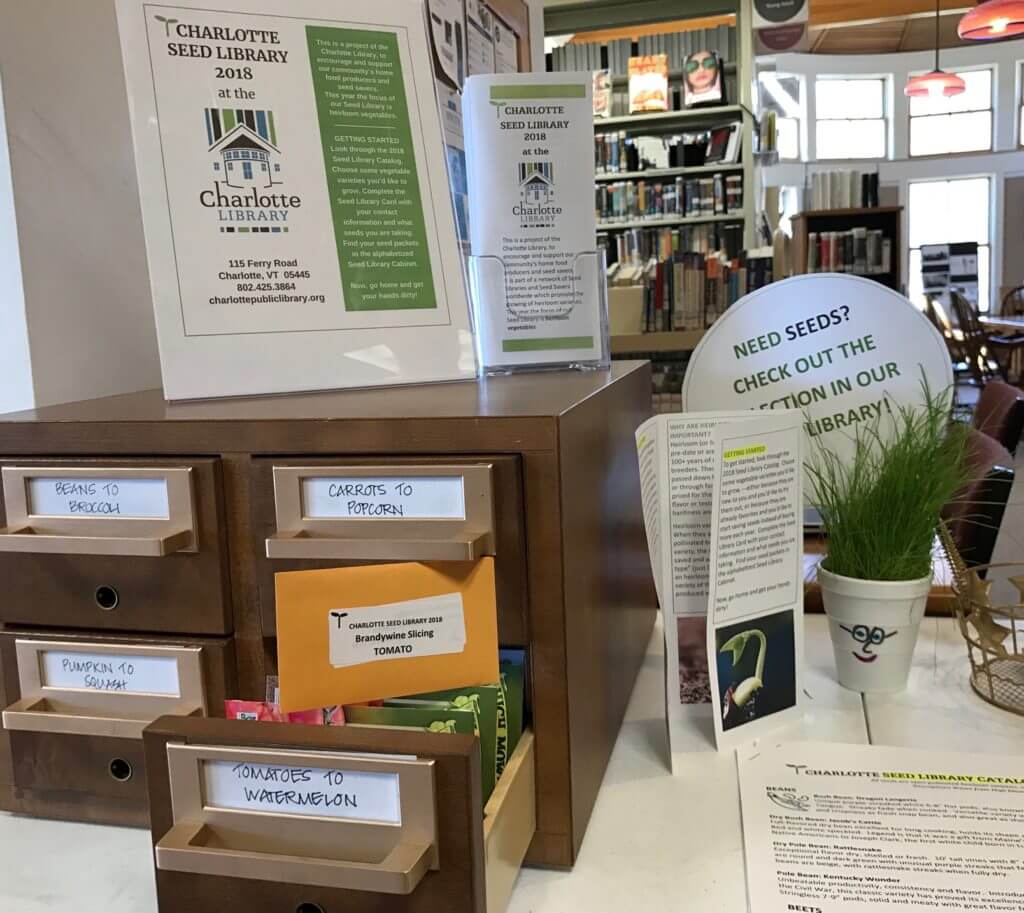2018 Charlotte Seed Library now open

The Charlotte Library is happy to announce the opening of our 2018 Seed Library and invites both experienced and new gardeners to become members. The project is intended to encourage and support our community’s home food producers and seed savers. It is part of a worldwide network of seed libraries and seed savers that promote the growing of heirloom varieties—because growing, eating/enjoying and then saving seeds for next year is the only way their rich biodiversity survives. This year, our focus is on vegetables.
The Seed Library is located near the Library main desk and is self-serve. There are more than 30 locally adapted varieties of vegetables to choose from, and these are described in the 2018 Seed Library Catalog. Select some varieties you would like to grow, either because they are new to you or because they are already favorites and you’d like to start saving seeds instead of buying more each year. Complete the Seed Library card with your contact information and what seeds you are “signing out.” Then find your seed packets in the alphabetized Seed Library Cabinet. Packets contain a few organically grown seeds of that heirloom variety for you to grow and enjoy. There is no charge.
Participants are encouraged to use eco-friendly gardening techniques and to save some of this year’s harvest of seed to restock the Seed Library for next year. We will support you with gardening and seed-saving technical information and hands-on learning opportunities during the year. And you will enjoy a delicious and healthy reward for your labor!
A word about heirloom varieties and why they are important
Varieties arise naturally through cross-pollination within the pool of biodiversity of a plant species. When a variety is self-pollinated or pollinated by another plant of the same variety, the seeds produced can be saved and will grow out “true to type” (just like the parent). Varieties are called heirloom (or heritage) when they either pre-date or are unaltered by the last 100+ years of intentional modifications by plant breeders.
Savable (heirloom) seeds have been the core of agriculture since the beginning. Farmers and home food producers around the world have traditionally saved seed from one year’s harvest to plant next season, selecting for desirable characteristics related to hardiness, productivity, flavor, texture, color or something else that made them special. Seeds passed from neighbor to neighbor and through families for generations. For more than 10,000 years it was this way, until the early-mid 1900s when plant breeders started crossing different varieties of the same species to create hybrids. Hybrids also have special desirable characteristics, but unlike heirlooms, they only run true in the first (F1) generation. If you want to repeat the characteristics of a particular hybrid, you must repeat the original cross. If farmers want to grow hybrids, they must purchase seed each year rather than saving their own.
With the rise of large-scale commercial agriculture, hybrid seeds were also commercialized and aggressively promoted to both large and small farmers as the “way of the future.” Combined with chemical fertilizer and pesticide inputs, higher yields of food crops were possible, but with that has come an astronomical rise in production costs per acre, the poisoning of air, water and soil, and crushing farmer debt. Not only that, but in the last 100 years a shocking 90 percent of the world’s diversity of heirloom food crop varieties simply died out when farmers stopped using and saving their seeds. Significantly, it is the biological diversity in the gene pool of heirloom varieties that provides a plant species with resilience and the ability to adapt and persist in changing environmental conditions.
Clearly we need to keep the heirloom varieties we still have going, and fortunately we have a rewarding and delicious way to do that: grow and enjoy them, and save some seeds for replanting! The Charlotte Seed Library can help you do that.
